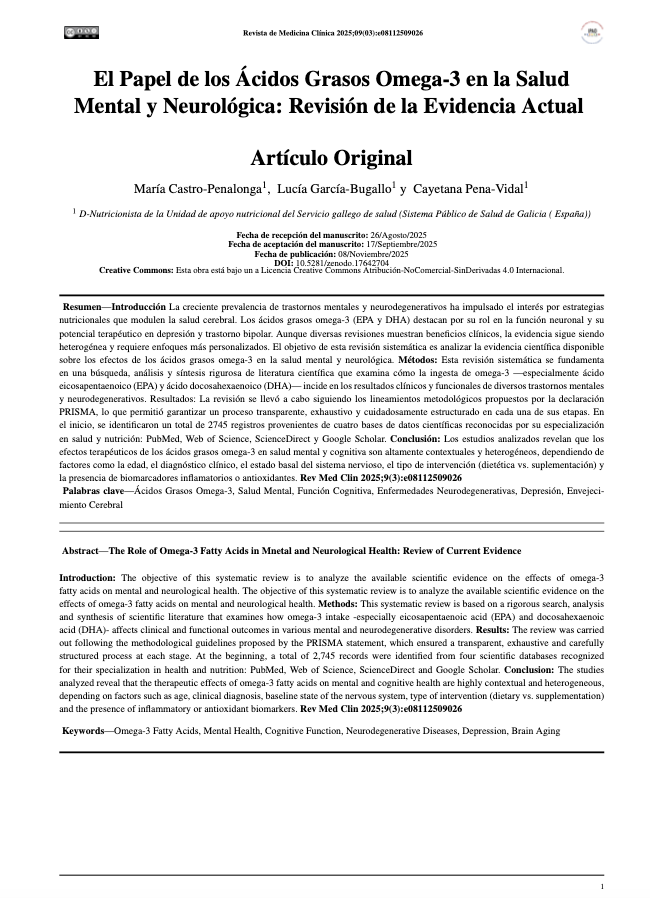Resumen
Introducción: La creciente prevalencia de trastornos mentales y neurodegenerativos ha impulsado el interés por estrategias nutricionales que modulen la salud cerebral. Los ácidos grasos omega-3 (EPA y DHA) destacan por su rol en la función neuronal y su potencial terapéutico en depresión y trastorno bipolar. Aunque diversas revisiones muestran beneficios clínicos, la evidencia sigue siendo heterogénea y requiere enfoques más personalizados. El objetivo de esta revisión sistemática es analizar la evidencia científica disponible sobre los efectos de los ácidos grasos omega-3 en la salud mental y neurológica. Métodos: Esta revisión sistemática se fundamenta en una búsqueda, análisis y síntesis rigurosa de literatura científica que examina cómo la ingesta de omega-3 —especialmente ácido eicosapentaenoico (EPA) y ácido docosahexaenoico (DHA)— incide en los resultados clínicos y funcionales de diversos trastornos mentales y neurodegenerativos. Resultados: La revisión se llevó a cabo siguiendo los lineamientos metodológicos propuestos por la declaración PRISMA, lo que permitió garantizar un proceso transparente, exhaustivo y cuidadosamente estructurado en cada una de sus etapas. En el inicio, se identificaron un total de 2745 registros provenientes de cuatro bases de datos científicas reconocidas por su especialización en salud y nutrición: PubMed, Web of Science, ScienceDirect y Google Scholar. Conclusión: Los estudios analizados revelan que los efectos terapéuticos de los ácidos grasos omega-3 en salud mental y cognitiva son altamente contextuales y heterogéneos, dependiendo de factores como la edad, el diagnóstico clínico, el estado basal del sistema nervioso, el tipo de intervención (dietética vs. suplementación) y la presencia de biomarcadores inflamatorios o antioxidantes.
Referencias
World Health Organization. Mental health [Internet]. 2022 [citado 2025 Ago 24]. Disponible en: https://www.who.int/news-room/fact-sheets/detail/mental-health-strengthening-our-response
Naureen Z, Dhuli K, Medori MC, et al. Suplementos dietéticos en enfermedades neurológicas y envejecimiento cerebral. J Prev Med Hyg. 2022;63(2 Supl 3):E174–E188.
Debbabi M, Zarrouk A, Bezine M, et al. Comparison of the effects of major fatty acids present in the Mediterranean diet on neurotoxicity. Chem Phys Lipids. 2017;207:151–70.
Stoll AL, Severus WE, Freeman MP, et al. Omega 3 fatty acids in bipolar disorder: a preliminary double-blind, placebo-controlled trial. Arch Gen Psychiatry. 1999;56(5):407–12.
Parletta N, Zarnowiecki D, Cho J, et al. A Mediterranean-style dietary intervention supplemented with fish oil improves mental health in people with depression. Nutr Neurosci. 2019;22(7):474–87.
Jacka FN, O'Neil A, Opie R, et al. A randomised controlled trial of dietary improvement for adults with major depression (SMILES trial). BMC Med. 2017;15:23.
Caballer García J, Torío Ojea E, Jiménez Treviño L, Sánchez Fernández S. Ácidos grasos omega-3 y depresión: una revisión sistemática. Psiquiatr Biol. 2017;24(1):10–17.
Appleton KM, Voyias PD, Sallis HM, et al. Omega-3 fatty acids for depression in adults. Cochrane Database Syst Rev. 2021;CD004692.
García-Toro M, Vicens-Pons E, Gili M, et al. Obesity, metabolic syndrome and Mediterranean diet: Impact on depression outcome. J Affect Disord. 2016;194:105–8.
Page MJ, McKenzie JE, Bossuyt PM, Boutron I, Hoffmann TC, Mulrow CD, et al. The PRISMA 2020 statement: an updated guideline for reporting systematic reviews. BMJ. 2021;372:n71.
Critical Appraisal Skills Programme (CASP). CASP checklists: Making sense of evidence [Internet]. Oxford: CASP UK; 2018 [cited 2025 Aug 21]. Available from: https://casp-uk.net/casp-tools-checklists/
Ouzzani M, Hammady H, Fedorowicz Z, Elmagarmid A. Rayyan—a web and mobile app for systematic reviews. Syst Rev. 2016;5(1):210.
Amminger, G. P., Rice, S., Davey, C. G., Quinn, A. L., Hermens, D. F., Zmicerevska, N., Nichles, A., Hickie, I., Incerti, L., Weller, A., Joseph, S., Hilton, Z., Pugh, C., Rayner, M., Reid, N., Ratheesh, A., Yung, A. R., Yuen, H. P., Mackinnon, A., Hetrick, S., … Lin, A. (2024). The Addition of Fish Oil to Cognitive Behavioral Case Management for Youth Depression: A Randomized, Double-Blind, Placebo-Controlled, Multicenter Clinical Trial. Biological psychiatry, 95(5), 426–433. https://doi.org/10.1016/j.biopsych.2023.06.015
Kolodziej, Piotr Lech Czarny, Sylwia Ziolkowska, Katarzyna Bialek, Janusz Szemraj, Piotr Galecki, Kuan-Pin Su, Tomasz Sliwinski, How fish consumption prevents the development of Major Depressive Disorder? A comprehensive review of the interplay between n-3 PUFAs, LTP and BDNF, Progress in Lipid Research, Volume 92, 2023,. https://www.sciencedirect.com/science/article/pii/S0163782723000449
Suh, S.W., Lim, E., Burm, SY. et al. The influence of n-3 polyunsaturated fatty acids on cognitive function in individuals without dementia: a systematic review and dose–response meta-analysis. BMC Med 22, 109 (2024). https://doi.org/10.1186/s12916-024-03296-0
Ciappolino, V., DelVecchio, G., Prunas, C., Andreella, A., Finos, L., Caletti, E., Siri, F., Mazzocchi, A., Botturi, A., Turolo, S., Agostoni, C., & Brambilla, P. (2020). The Effect of DHA Supplementation on Cognition in Patients with Bipolar Disorder: An Exploratory Randomized Control Trial. Nutrients, 12(3), 708. https://doi.org/10.3390/nu12030708
Saunders, E. F. H., Mukherjee, D., Myers, T., Wasserman, E., Hameed, A., Bassappa Krishnamurthy, V., MacIntosh, B., Domenichiello, A., Ramsden, C. E., & Wang, M. (2022). Adjunctive dietary intervention for bipolar disorder: a randomized, controlled, parallel-group, modified double-blinded trial of a high n-3 plus low n-6 diet. Bipolar disorders, 24(2), 171–184. https://doi.org/10.1111/bdi.13112
Berger, M., Seemüller, F., Voggt, A., Obermeier, M., Kirchberg, F., Löw, A., Riedel, M., von Schacky, C., & Severus, E. (2022). Omega-3 fatty acids in bipolar patients with a low omega-3 index and reduced heart rate variability: the "BIPO-3" trial. International journal of bipolar disorders, 10(1), 9. https://doi.org/10.1186/s40345-022-00253-9
Eslahi, Hadi et al. “The effects of omega 3 fatty acids on the serum concentrations of pro inflammatory cytokines anddepression status in patients with bipolar disorder: A randomized double-blind controlled clinical trial.” Journal of research in medical sciences : the official journal of Isfahan University of Medical Sciences vol. 28 36. 21 Apr. 2023, doi:10.4103/jrms.jrms_342_22
Gholipour D, Shahraki M, Saravani M, Payandeh A, Eslahi H. The Effect of Omega-3 Supplementation on Serum Levels of Antioxidant Status in Patients With Bipolar Disease: A Randomized Double-blind Controlled Clinical Trial. BCN 2024; 15 (1) :109-116URL: http://bcn.iums.ac.ir/article-1-2490-en.html
McNamara, R.K.; Strawn, J.R.; Tallman, M.J.; Welge, J.A.; Patino, L.R.; Blom, T.J.; DelBello, M.P. Effects of Fish Oil Monotherapy on Depression and Prefrontal Neurochemistry in Adolescents at High Risk for Bipolar I Disorder: A 12-Week Placebo-Controlled Proton Magnetic Resonance Spectroscopy Trial. J. Child. Adolesc. Psychopharmacol. 2020, 30, 293–305

Esta obra está bajo una licencia internacional Creative Commons Atribución-NoComercial-SinDerivadas 4.0.
Derechos de autor 2025 María Castro Penalonga, Lucía García-Bugallo, Cayetana Pena Vidal

